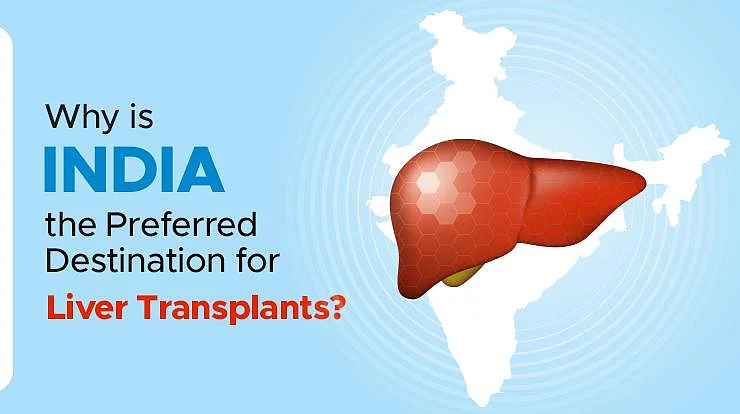India plays a crucial role in medical tourism, particularly in complex, high-stakes medical fields like liver transplantation. The country's advancements in healthcare infrastructure, experienced surgeons, and affordable costs have made it a significant reputation as a hub for liver transplantation for international patients. According to a report, Dr. Anupam Sibal, Group Medical Director and senior pediatric gastroenterologist at Apollo Hospital Delhi, said that the hospital receives liver transplant patients from over 50 countries and has more than 90% success rates. To keep India at the forefront of medical tourism, the Indian government has also created programs and policies that will help Indian hospitals succeed in the medical tourism market. This article delves into the factors driving this trend, the process of medical tourism for liver transplants in India, and the challenges and future outlook of the sector.
Liver Transplantation and Why India is a Perfect Destination

Liver transplantation or hepatic transplantation is the procedure of replacing a damaged liver with a healthy one from another. Cirrhosis is the leading cause of liver transplantation in adults. Cirrhosis is a disorder in which the liver gradually deteriorates and malfunctions owing to persistent damage. Liver transplantation can help treat both acute liver failure and end-stage liver disease. Since no apparatus or technology can today reliably perform all of the liver's activities, liver transplantation is the only therapy option for hepatic insufficiency or failure.
According to the most recent data, the liver transplant success rate in India is about 89%, with individual liver transplant survival rates ranging from 95% to 60%. There are some prominent hospitals in India like Apollo, Max Healthcare, AILBS, etc. that aim to receive the best therapy, resulting in a high success rate. According to a report by ET (Economic Times), In 2023, India had 18,378 organ transplants, with 42 patients receiving multiple organs, for a total of 18,336 recipients. According to government data from the National Organ and Tissue Transplant Organisation (NOTTO), overseas nationals will account for about 10% of all organ transplants in India by 2023. Among the 18,336 organ recipients, 1,851 were foreigners. The biggest number of these procedures were performed in Delhi, Rajasthan, and West Bengal.
There are certain reasons why India is preferable in terms of liver transplantation:
Affordability: On average, the costs of liver transplantation in India will cost around Rs 20 to 25 lakh, while the same procedure in the US will cost Rs 2.5 crore and Rs 1.5 crore in Singapore. The cost variation in healthcare makes India a preferable one when it comes to medical tourism.
Highly Skilled Surgeons and Healthcare Professionals: India has a substantial number of liver transplant specialists trained in advanced medical techniques. Many surgeons have worked and trained internationally and are affiliated with top global medical institutions. Their experience and skills ensure a high success rate, providing reassurance to patients coming from overseas. For example, Dr. Neerav Goyal, Senior Consultant Liver Transplant, Apollo Hospital, Delhi said, “Patients arriving from several developed countries like Kenya, UAE, Indonesia, Arab, Nigeria, Sudan, Pakistan, Bangladesh, Nepal, etc. have gotten the best result in Indian hospitals at an affordable range”.
World-Class Hospitals and Technology: India’s hospitals, particularly in cities like New Delhi, Mumbai, Chennai, and Bangalore, are equipped with cutting-edge technology and advanced facilities. These hospitals are accredited by organizations such as the Joint Commission International (JCI), ensuring they meet global standards of healthcare delivery. For example, Medanta, Apollo, Fortis Healthcare, Artemis Healthcare, etc accredited by JCI and provide the best healthcare.
Shorter waiting time: In countries like the U.S., the UK, and Canada, patients often face long waiting periods from 1 month to 5 years for organ transplants due to strict organ allocation systems. In India, where living-donor liver transplants are allowed, patients can often find compatible donors within their family, enabling quicker access to life-saving surgery. According to a report, Dr Arvinder Soin, the chairman and chief surgeon of the Medanta Institute of Liver Transplantation, who was one of the first doctors to conduct liver transplantation in India, said that in India over 80% of liver transplants involve live donors and success rate of transplants with live donors is higher than with brain dead donors.
Government Initiatives: The Indian government has taken several steps to facilitate medical tourism, including streamlined visa processes, such as the Medical Visa (M-Visa) and the Medical Attendant Visa, designed for patients and their caregivers. Additionally, the government has promoted the growth of health and wellness tourism, which complements the overall recovery and healing process for medical tourists.
The Liver Transplant Process for International Patients in India
Pre-Consultation and Assessment: The journey typically begins with an online consultation. Patients share their medical reports with Indian healthcare providers, who assess eligibility and suggest an initial treatment plan.
Choosing a Hospital and Surgeon: India has many renowned hospitals specializing in liver transplants. Patients usually select a facility based on accreditation, patient testimonials, success rates, and the expertise of the transplant team.
Arranging the Medical Visa and Travel: The Med-Visa process allows patients and up to two caregivers to stay in India for six months to a year. Hospitals often assist in the visa application process to ensure a smooth experience.
Donor Matching and Evaluation: In India, patients can receive a liver donation from a living donor, often a family member. The donor undergoes rigorous medical screening to ensure they meet all requirements and are healthy enough for the procedure.
The Transplant Procedure: During the surgery, a portion of the donor's liver is transplanted into the recipient. Advanced surgical techniques, such as laparoscopic or minimally invasive approaches, are often used, which reduce recovery time and potential complications.
Post-Operative Care and Monitoring: Recovery involves close monitoring to ensure there are no complications like rejection or infection. Hospitals in India provide comprehensive post-operative care, including regular blood tests, liver function monitoring, and medication management.
Follow-Up and Return to Home Country: Once the patient’s condition stabilizes, they can return home with detailed instructions for follow-up care. Many Indian hospitals provide telemedicine services, allowing international patients to consult their doctors remotely.
India’s rise as a global destination for liver transplants within the medical tourism landscape is fueled by its unique combination of skilled healthcare professionals, affordable costs, world-class hospitals, and supportive government policies. While challenges remain, the future looks promising, with enhanced technology, government support, and patient-focused services helping India solidify its reputation. For patients worldwide seeking high-quality, affordable liver transplants, India offers a compelling option, backed by a healthcare system that meets the highest standards of care.



























